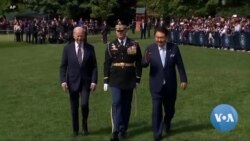South Korea has agreed to not pursue its own nuclear weapons program.
Welcome to VOA Asia Weekly. I'm Chris Casquejo in Washington. That story is coming up, but first, making headlines:
Chinese leader Xi Jinping talked by phone Wednesday with Ukrainian President Volodymyr Zelenskyy, state media reported. Xi told Zelenskyy that China will send special representatives to Ukraine and hold talks with all parties on resolving the crisis there.
The leader of the Islamic State terror group cell that carried out the August 2021 bombing at Kabul International Airport that killed 13 U.S. troops and about 170 Afghan civilians fleeing Afghanistan is dead, slain during recent clashes with Afghanistan's ruling Taliban. U.S. officials, who initially confirmed the death to VOA on the condition of anonymity in order to discuss the intelligence, declined to name the cell leader or say when or where he was killed.
Japan's Prime Minister Fumio Kishida said Tuesday that eight Japanese citizens, including embassy officials and their family, were airlifted from an air force base in northern Khartoum, the capital of Sudan, by the French military, after Japanese defense troops evacuated dozens of others to nearby Djibouti.
U.S. and Philippines armed forces sank a mock enemy warship off the southeast Asian nation’s western coast Wednesday during annual joint military drills. The Balikatan is the largest ever annual drill, with over 17,000 troops from the Philippines and U.S. participating.
Taiwan's annual Han Kuang military drills will consider China's recent war games to focus on combating a blockade of the island and preserving the fighting ability of its forces, the defense ministry said on Wednesday. Tabletop drills will take place in mid-May, and live-fire exercises the last week of July.
The United States and South Korea signed a landmark agreement Wednesday that gives Seoul a greater decision-making role in U.S. contingency planning against a possible North Korea nuclear attack, in exchange for Seoul agreeing not to pursue its own nuclear weapons program. VOA’s Anita Powell reports from the White House.
President Joe Biden affirmed the U.S. commitment to defend against North Korean aggression as he welcomed South Korean President Yoon Suk Yeol for a pomp-filled state visit, just the second such visit of his administration.
“Look, a nuclear attack by North Korea against the United States or its allies and partisan – partners – is unacceptable and will result in the end of whatever regime were to take such an action.”
Pyongyang has “greatly increased its missile launch activities” this year and last, the United Nations says.
Under the new Washington Declaration, the two allies will bolster defenses against Pyongyang. The United States will set up a Nuclear Consultative Group to allow greater information sharing and give Seoul a greater voice in deliberations over U.S. weapons deployment. In return, Seoul will maintain its non-nuclear status in accordance with the Non-Proliferation Treaty it ratified in 1975.
Yoon, on Wednesday, welcomed the agreement.
“In the event of North Korea's nuclear attack, and [our countries] promised to respond swiftly, overwhelmingly and decisively, using the full force of the Alliance including the United States’ nuclear weapons.”
Biden said the two presidents also discussed security beyond the Korean Peninsula.
“We discussed our work together on promoting peace and stability in the Taiwan Straits, ensuring freedom of navigation in the South China Sea and beyond. Excuse me. I also affirmed – we together affirmed our shared commitment to stand with the people of Ukraine against Russia's brutal assault on their freedom or territorial integrity and democracy.”
The U.S. and South Korea have been allies since the end of the Korean war, 70 years ago, but analysts say there are questions in South Korea about the strength and credibility of the agreement.
“It takes it off the table the possibility of any kind of South Korean development of an indigenous nuclear capability, and it really bolsters the idea that the U.S. and South Korea are going to address North Korea together. ”
But, Snyder added, the potential for cooperation continues to grow, including in space.
On Tuesday, Yoon and Vice President Kamala Harris explored the two nations’ growing ties in space exploration and security, with a tour of a NASA facility near Washington.
That’s a sign, he said, that this partnership may go to a new frontier.
Anita Powell, VOA News, the White House.
Visit voanews.com for the most up-to-date stories.
Thanks for watching VOA Asia Weekly. I’m Chris Casquejo. Until next week.
We leave you on a high note: South Korean President Yoon singing the Don McLean song “American Pie” during his White House visit.











